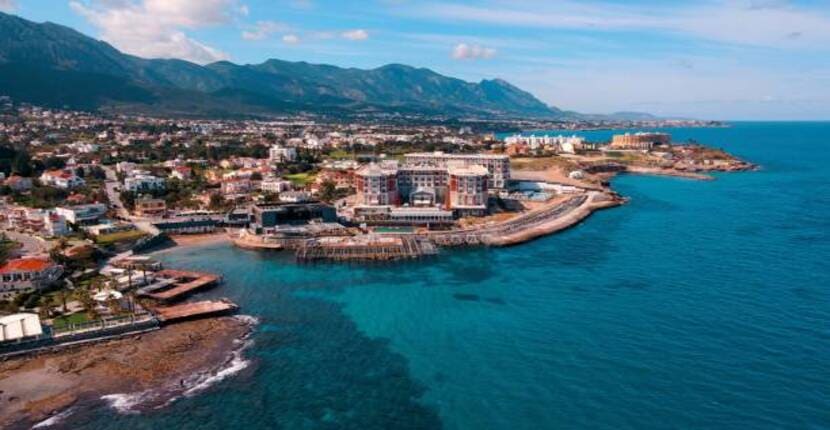Saturday, May 17, 2025
In a bold move that has drawn significant international attention, Turkey has launched a provocative new tourism initiative branded as “Island Cyprus”, targeting the occupied territories of Northern Cyprus. This campaign seeks to establish the region as a standalone global tourism destination, intensifying longstanding geopolitical tensions in the Eastern Mediterranean.
The announcement came during a high-profile event in Istanbul, underlining Turkey’s commitment to promoting the so-called Turkish Republic of Northern Cyprus (TRNC)—a self-declared entity recognized only by Ankara. The campaign highlights the rapid growth of tourism in Northern Cyprus, with a dramatic increase in flights and visitors, predominantly from Turkey. It emphasizes the natural beauty, cultural heritage, and unique island identity of the region, aiming to draw international tourists and bolster Turkey’s influence in Cyprus.
However, the initiative has been met with sharp criticism from Greek Cypriots and the broader international community. Many view the campaign as an attempt to legitimize the ongoing occupation and circumvent United Nations resolutions that call for the reunification of the island. This new branding effort follows a similar, contentious campaign called “Turkaegean,” which faced legal challenges and was recently struck down by the European Union Intellectual Property Office.
In this article, we’ll explore the details and implications of Turkey’s “Island Cyprus” tourism campaign, the political context surrounding the move, and what it means for tourism and diplomacy in the region.
A Growing Tourism Industry Amid Political Disputes
Tourism in the occupied northern part of Cyprus has experienced remarkable growth in recent years, despite political isolation. Flights have surged from a few per week to hundreds per month, with more than half a million visitors arriving, mainly from Turkey. This uptick has been cited as evidence of the region’s tourism potential, showcasing beaches, historical sites, and local cuisine that appeal to travelers.
The “Island Cyprus” campaign seeks to capitalize on this momentum by expanding the market internationally and creating a distinct brand identity separate from the internationally recognized Republic of Cyprus. This effort aligns with Turkey’s broader strategy of strengthening its political and economic presence in Northern Cyprus.
The campaign includes ambitious plans to develop infrastructure and promote the region as an attractive, standalone destination for tourists interested in history, culture, and natural beauty.
Controversy and International Reactions
The “Island Cyprus” branding has provoked strong backlash from the Greek Cypriot government and many international observers. Critics argue that the campaign undermines decades of diplomatic efforts aimed at resolving the Cyprus dispute through reunification and peace talks.
This initiative follows the contentious “Turkaegean” campaign launched in 2021, which sought to trademark the name for Turkey’s coastal region. That effort was successfully challenged by Greece and rejected by the EU Intellectual Property Office in early 2025, reinforcing the delicate nature of cultural and territorial claims in the region.
By positioning Northern Cyprus as an independent tourism hotspot, the “Island Cyprus” campaign is perceived as a political tool designed to normalize the separation of the island, disregarding UN resolutions and international law.
The Role of Tourism in Geopolitical Influence
Tourism has long been a powerful tool in shaping perceptions and strengthening political claims. By attracting visitors and investment, regions can boost their economic standing and enhance their global profile. In the case of Northern Cyprus, tourism development serves both economic and strategic purposes for Turkey.
The campaign’s emphasis on the natural and cultural treasures of the area attempts to foster a sense of legitimacy and belonging among tourists and investors alike. However, this soft power strategy clashes with the broader international consensus supporting the sovereignty and territorial integrity of the Republic of Cyprus.
What This Means for Travelers and the Region
For travelers, the “Island Cyprus” campaign introduces new tourism options in Northern Cyprus, featuring beautiful beaches, historical landmarks, and local hospitality. Yet, prospective visitors should be aware of the political sensitivities and ongoing disputes surrounding travel to and within Cyprus.
The region’s status is complex, and international governments continue to encourage peaceful resolution between the divided communities. Visitors may face differing travel advisories and restrictions depending on their nationality and travel plans.
Looking Ahead: Prospects for Tourism and Peace
The introduction of the “Island Cyprus” campaign highlights the intertwined nature of tourism and geopolitics. While tourism can bring economic benefits and cultural exchange, it also reflects deeper political narratives that shape the region’s future.
Efforts to resolve the Cyprus conflict have spanned decades, with intermittent progress and setbacks. The latest tourism initiative by Turkey and Northern Cyprus signals continued challenges in achieving lasting peace but also underscores the importance of tourism as an economic lifeline.
The international community remains watchful, encouraging dialogue and cooperation to ensure that tourism fosters understanding rather than division.
Final Thoughts
Turkey’s “Island Cyprus” tourism campaign represents a significant and controversial development in the Eastern Mediterranean’s complex political landscape. While the initiative seeks to showcase the natural and cultural riches of Northern Cyprus, it also raises serious questions about sovereignty, legality, and the future of the island.
As tourism becomes a battleground for influence, travelers, policymakers, and industry stakeholders must navigate these challenges with awareness and sensitivity. The evolving story of Cyprus serves as a reminder of the power of tourism—not just as a driver of economic growth, but as a force that can either unite or divide communities.
